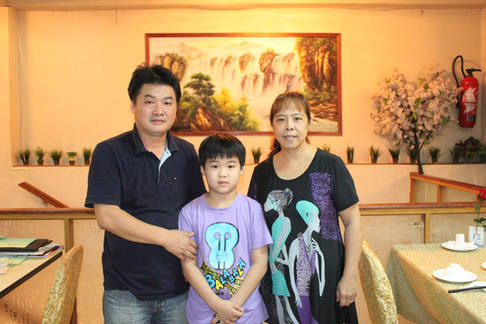|
Meet a Family of Chinese Traders in Cameroon
By LI ZHIJIAN
THERE are about 4,000 Chinese in Cameroon, and fully a quarter of them work at local branches of China's state-owned enterprises. The rest are employees of private enterprises and independent businessmen. What is life like there? How do they get along with local people? An interview with a Chinese family in Douala tells us much about life in Cameroon.
 |
| Hu Xiaomeng and his family. |
On Ahmadou Ahidjo Street in Douala, the economic capital of Cameroon, you can spot several buildings bearing Chinese characters, such as Da Shanghai (Great Shanghai) and Zhong Ka Youyilou (Building of Sino-Cameroon Friendship). At the end of Cameroon's "Chinatown" the Great China Hotel and the Great China Market specifically attract passersby. The owner of both brands is Hu Xiaomeng.
A graduate of the English Department of Sun Yat-sen University in Guangzhou, in 1995 Hu gave up his stable job at a textile import and export company in Hubei Province, and set off for Cameroon with only US $2,000 in his pocket. At that time, there were only eight Chinese in Douala and it was not that easy to do business there. The first attempt by Mr. Hu was fraught with difficulties.
His first year in Cameroon, 1996, was marked by a long rainy season. Noticing that there was a great demand for umbrellas, Hu imported a container of umbrellas from China valued at RMB 600,000, and planned to provide them wholesale to local distributors. However, he soon found that umbrellas made in China were not large enough to shelter people from the heavy torrential rain in Cameroon. The volume he unloaded was minimal. The approaching of the end of the rainy season found many umbrellas unsold.
Hu changed his strategy and turned to retail. He went to every local market in Cameroon to sell his umbrellas. Although the profit earned was less than he anticipated, he overcame the risk inherent in such a large shipment.
Business is war without bullets. Hu learned he wouldn't always be that lucky.
In 1997, Mr. Hu set his sights on local smokers, and imported lighters from China valued at RMB 100,000. Unfortunately, he found that smokers had the habit of buying one cigarette instead of a pack of cigarettes, and sellers always lit the cigarette for them, so the demand for lighters was very limited. In the end, Hu only sold RMB 20,000 of his stock.
"The quality and price of Chinese products have a unique advantage in the African market, but to do business, the importer must familiarize himself with the characteristics of the target market and people's consumption habits. In a completely strange environment, it is difficult to do that," said Hu.
To learn more about Cameroonian culture, Hu actively integrated into the local society and made friends with many Cameroonians. With the experiences and lessons of the first two years, Hu grasped the rules of business in Cameroon, gradually changing from an attitude of "we sell what we have" to "we sell what they need." At Christmas time in 1998 he had success with colored ribbons, small red hats and other festive items. That year, the trade volume between China and Cameroon exceeded US $100 million.
As more and more Chinese seemed to be doing business in Douala, Hu established the Great China Market, home to more than 50 shops and 60 warehouses. The market not only offers a platform for Chinese businessmen based in Cameroon, but also serves as a distribution center to Chad, Equatorial Guinea, Nigeria and other countries of central and western Africa.
Hu not only did well in business, but also met his true love abroad in 1999. His wife Yu Zhongyu is a native of Wenzhou in Zhejiang Province who also does business in Cameroon.
As president of the Chinese Association in Douala, Ms. Yu manages their enterprise expertly, with a business savvy topped by social insight: she encourages local Chinese to adapt to and embrace Cameroonian culture and society. "We and our African friends attach great importance to relationships and are willing to help others in trouble. The true, the good and the beautiful of humanity lie beyond differences in culture," said Yu, who is of the Catholic faith.
Their nine-year-old son Hu Tianze is the couple's priority. For his education and especially his grasp of the Chinese language, they sent him to China. Each year, the parents meet up with their son only twice, during the summer vacation and the Spring Festival. "Certainly we miss him a lot, but as a Chinese he must be culturally rooted in China," said Mr. Hu hugging his son.
At the end of the interview, several customers entered the hotel to dine. Hu Xiaomeng greeted them with a smile and used fluid French to ask his Cameroonian employees take their orders. Hu Tianze clung to his mother, and expressed his reluctance to go back to China, but then all children feel the summer vacation should never end. | 